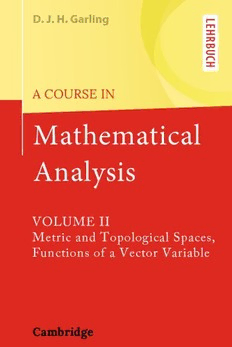Table Of ContentD. J. H. Garling
A COURSE IN
Mathematical
Analysis
VOLUME II
Metric and Topological Spaces,
Functions of a Vector Variable
Cambridge
A COURSE IN MATHEMATICAL ANALYSIS
Volume II: Metric and Topological Spaces, Functions of a Vector Variable
The three volumes of A Course in Mathematical Analysis provide a full
and detailed account of all those elements of real and complex analysis that
an undergraduate mathematics student can expect to encounter in the first
two or three years of study. Containing hundreds of exercises, examples
and applications, these books will become an invaluable resource for both
students and instructors.
Volume I focuses on the analysis of real-valued functions of a real vari-
able. This second volume goes on to consider metric and topological spaces.
Topics such as completeness, compactness and connectedness are devel-
oped, with emphasis on their applications to analysis. This leads to the
theory of functions of several variables: differentiation is developed in a
coordinate free way, while integration (the Riemann integral) is established
for functions defined on subsets of Euclidean space. Differential manifolds
in Euclidean space are introduced in a final chapter, which includes an
account of Lagrange multipliers and a detailed proof of the divergence the-
orem. Volume III covers complex analysis and the theory of measure and
integration.
d. j. h. garling is Emeritus Reader in Mathematical Analysis at the
University of Cambridge and Fellow of St. John’s College, Cambridge. He
has fifty years’ experience of teaching undergraduate students in most areas
of pure mathematics, but particularly in analysis.
A COURSE IN
MATHEMATICAL ANALYSIS
Volume II
Metric and Topological Spaces,
Functions of a Vector Variable
D. J. H. G A R L I N G
Emeritus Reader in Mathematical Analysis,
University of Cambridge, and
Fellow of St John’s College, Cambridge
TheEdinburghBuilding,CambridgeCB28RU,UK
PublishedintheUnitedStates ofAmericabyCambridgeUniversityPress,NewYork
CambridgeUniversityPressispartoftheUniversityofCambridge.
ItfurtherstheUniversity’smissionbydisseminatingknowledgeinthepursuitof
education, learningandresearchatthehighestinternational levelsofexcellence.
www.cambridge.org
Informationonthistitle:www.cambridge.org/9781107675322
(cid:2)c D.J.H.Garling2013
Thispublicationisincopyright.Subjecttostatutory exception
andtotheprovisionsofrelevantcollectivelicensingagreements,
noreproductionofanypartmaytakeplacewithoutthewritten
permissionofCambridgeUniversityPress.
Firstpublished2013
PrintedintheUnitedKingdombyCPIGroupLtd,CroydonCR04YY
A catalogue record for this publication is available from the British Library
Library of Congress Cataloguing inPublication Data
Garling,D.J.H.
Metricandtopologicalspaces,functions ofavector variable/D.J.H.Garling.
pages cm.–(Acourseinmathematical analysis;volume2)
Includesbibliographicalreferencesandindex.
ISBN978-1-107-03203-3(hardback) –ISBN978-1-107-67532-2 (paperback)
1. Metricspaces 2. Topological spaces. 3. Vectorvaluedfunctions. I. Title.
QA611.28.G37 2013
514(cid:2).325–dc23 2012044992
ISBN978-1-107-03203-3 Hardback
ISBN978-1-107-67532-2Paperback
CambridgeUniversityPresshasnoresponsibilityforthepersistenceoraccuracyof
URLsforexternal orthird-partyinternetwebsitesreferredtointhispublication,
anddoesnotguaranteethatanycontent onsuchwebsites is,orwillremain,
accurate orappropriate.
Contents
Volume II
Introduction page ix
Part Three Metric and topological spaces 301
11 Metric spaces and normed spaces 303
11.1 Metric spaces: examples 303
11.2 Normed spaces 309
11.3 Inner-product spaces 312
11.4 Euclidean and unitary spaces 317
11.5 Isometries 319
11.6 *The Mazur−Ulam theorem* 323
11.7 The orthogonal group O 327
d
12 Convergence, continuity and topology 330
12.1 Convergence of sequences in a metric space 330
12.2 Convergence and continuity of mappings 337
12.3 The topology of a metric space 342
12.4 Topological properties of metric spaces 349
13 Topological spaces 353
13.1 Topological spaces 353
13.2 The product topology 361
13.3 Product metrics 366
13.4 Separation properties 370
13.5 Countability properties 375
13.6 *Examples and counterexamples* 379
14 Completeness 386
14.1 Completeness 386
v
vi Contents
14.2 Banach spaces 395
14.3 Linear operators 400
14.4 *Tietze’s extension theorem* 406
14.5 The completion of metric and normed spaces 408
14.6 The contraction mapping theorem 412
14.7 *Baire’s category theorem* 420
15 Compactness 431
15.1 Compact topological spaces 431
15.2 Sequentially compact topological spaces 435
15.3 Totally bounded metric spaces 439
15.4 Compact metric spaces 441
15.5 Compact subsets of C(K) 445
15.6 *The Hausdorff metric* 448
15.7 Locally compact topological spaces 452
15.8 Local uniform convergence 457
15.9 Finite-dimensional normed spaces 460
16 Connectedness 464
16.1 Connectedness 464
16.2 Paths and tracks 470
16.3 Path-connectedness 473
16.4 *Hilbert’s path* 475
16.5 *More space-filling paths* 478
16.6 Rectifiable paths 480
Part Four Functions of a vector variable 483
17 Differentiating functions of a vector variable 485
17.1 Differentiating functions of a vector variable 485
17.2 The mean-value inequality 491
17.3 Partial and directional derivatives 496
17.4 The inverse mapping theorem 500
17.5 The implicit function theorem 502
17.6 Higher derivatives 504
18 Integrating functions of several variables 513
18.1 Elementary vector-valued integrals 513
18.2 Integrating functions of several variables 515
18.3 Integrating vector-valued functions 517
18.4 Repeated integration 525
18.5 Jordan content 530
Contents vii
18.6 Linear change of variables 534
18.7 Integrating functions on Euclidean space 536
18.8 Change of variables 537
18.9 Differentiation under the integral sign 543
19 Differential manifolds in Euclidean space 545
19.1 Differential manifolds in Euclidean space 545
19.2 Tangent vectors 548
19.3 One-dimensional differential manifolds 552
19.4 Lagrange multipliers 555
19.5 Smooth partitions of unity 565
19.6 Integration over hypersurfaces 568
19.7 The divergence theorem 572
19.8 Harmonic functions 582
19.9 Curl 587
Appendix B Linear algebra 591
B.1 Finite-dimensional vector spaces 591
B.2 Linear mappings and matrices 594
B.3 Determinants 597
B.4 Cramer’s rule 599
B.5 The trace 600
Appendix C Exterior algebras and the cross product 601
C.1 Exterior algebras 601
C.2 The cross product 604
Appendix D Tychonoff’s theorem 607
Index 612
Contents for Volume I 618
Contents for Volume III 621

